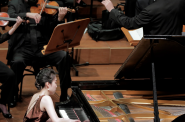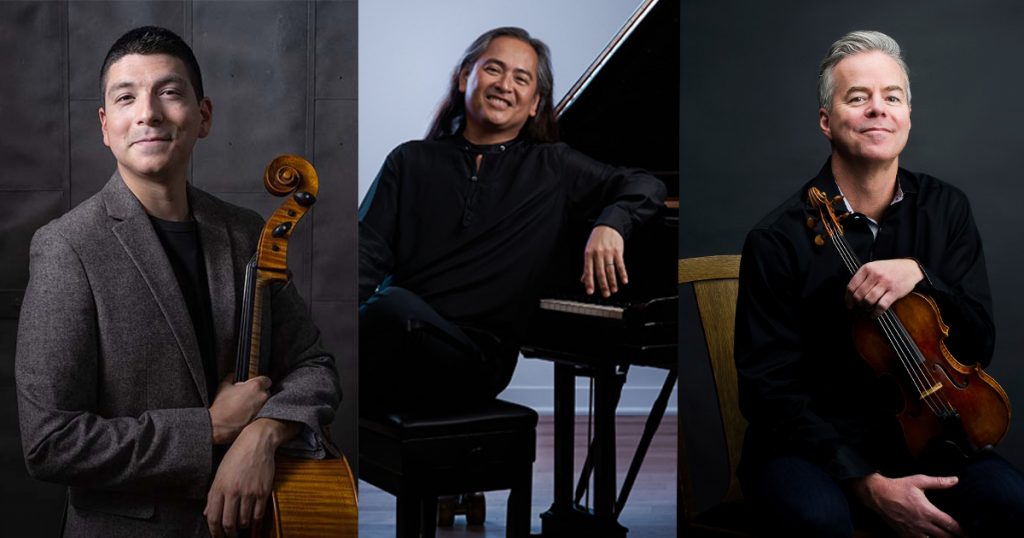It’s a ‘Chemistry Thing’ For Frankly Music
Frank Almond and two terrific guest artists perform Beethoven, Dvořák and Foss.
Frank Almond welcomes pianist Victor Santiago Asuncion and cellist Nicholas Mariscal for an evening of intimate chamber music in the last Frankly Music concert of the 2022-23 series. The concert next Monday, May 15, at Wisconsin Lutheran College features a powerful Beethoven piano trio and a pair of pleasant works for violin and piano by Antonín Dvořák and Lukas Foss.
A chamber music enthusiast, pianist Asuncion has performed with artists such as Lynn Harrell, Zuill Bailey, Andres Diaz, James Dunham, Antonio Meneses, Joshua Roman, Cho-Liang Lin, Giora Schmidt, and the Dover, Emerson, Serafin, Sao Paulo, and Vega String quartets. He was on the chamber music faculty of the Aspen Music Festival and the Garth Newel Summer Music Festival and was also the pianist for the Garth Newel Piano Quartet for three seasons. He currently lives in Evanston.
Cellist Mariscal is the recently appointed Assistant Principal Cellist of the Milwaukee Symphony Orchestra. A recent alumnus of the New World Symphony in Miami, Mariscal is a winner of the orchestra’s concerto competition, performing Khachaturian’s Concerto-Rhapsody for cello and orchestra. As an ardent performer of new and lesser-known music, Mariscal has been involved in dozens of premieres of new works and has performed extensively as a member of the Aspen Contemporary Ensemble, the Indiana University New Music Ensemble, and USC’s Thornton EDGE ensemble.
The two compositions for violin and piano share an American theme.
As a recognized artist in Europe, Dvořák was invited to New York in 1892 to became the director of the National Conservatory of Music of America in New York City. The founder and patron, Jeannette Meyers Thurber sought to build a program to create an American classical music identity. Recognized for incorporating the folk traditions of his native Czechoslovakia in his works, Dvořák explored Indian melodies and Negro spirituals while in the United States. He wrote the New World Symphony, the American Quartet and other works in his three years here. Writing for the Los Angeles Philharmonic, Orrin Howard comments, “In all of these, we find music by a genial visitor who, inevitably, was seeing America through Czech-colored glasses.”
The work to be played at this concert, the less-known but charming Sonatina for Violin and Piano in G Major (1893) was assigned Opus 100 and dedicated to Dvořák’s two oldest children. Inspired by travels in the Midwest, the slow movement was also marketed by his publisher as The Indian Lament. Jan Smaczny wrote for Hyperion Records, that “the relative simplicity of the writing has made the work a favourite for performance by young musicians. But if the execution is undemanding, the freshness and delicacy of the piece is not so easily captured.”
The evening pairs Dvořák’s Sonatina with another intimate work for violin and piano, Foss’s Three American Pieces (1944). Foss was born in Germany in 1922 and fled to the United States at age 15. A pupil of Hindemith at Philadelphia’s Curtis Institute, he began a lifelong friendship with classmate Leonard Bernstein.
Critic Arnold Steinhardt offers this view of Foss: “Like Mozart, he can make something breathtakingly complicated sound like the most natural thing in the world. He also sucks in the musical climate around him like a sponge. He quickly absorbed the influence of Copland and Stravinsky. Three American Pieces, written at the bright young age of 22 and still among his most attractive works, shows the confluence of all these musical sources.”
Milwaukee knows Foss as the conductor of the Milwaukee Symphony Orchestra from 1981 to 1986. And much of his later compositions reflect a much more experimental approach.
The third work on the program is decidedly more dramatic. Ludwig van Beethoven wrote his Trio in D Major, Op. 70, No. 1 “Ghost” (1808), in one of his most productive periods. The opening movement demonstrates the powerful driving force only Beethoven could create for a Trio. Beethoven could write on a symphonic scale, even for three instruments.
The “ghost” reference is obvious in the second movement. Opening ominously, the mood evokes mystery and magic. Beethoven was said to have sketched music for a possible opera based on Macbeth. His recycling of those notes for this trio is all we have of that effort. Critic Ryan Turner outlines Beethoven’s vision of Shakespeare’s three witches: “The Largo assai is introduced with an eerie, sustained three notes in the strings, followed by a melancholy response from the piano. After cautiously wandering through multiple tonal centers, unexpected pauses, sudden stops and outbursts, the haunting use of tremolando concludes the movement.”
The ghostly moment stands alone. The energy and joyful character of the first and last movements offer a contrasting frame often found in Beethoven’s chamber works.
Almond acknowledges the crucial element in a series that cycles through artists as often as Frankly Music. “As usual with this series, it’s this chemistry thing. All of us work well together.” That has been the magic of these carefully curated events.
The concert will begin at 7:00 p.m., Monday, May 15, at the Schwan Concert Hall at 8815 W. Wisconsin Ave. at Wisconsin Lutheran College. Tickets may be purchased online or at the door. Free parking is available in a parking structure west of the hall.
Next year marks the 20th year of the Frankly Music series. Almond is looking forward to celebrating with the return of a number of guests who have been a frequent part of the series.
If you think stories like this are important, become a member of Urban Milwaukee and help support real, independent journalism. Plus you get some cool added benefits.
Preview
-
PianoArts Festival Features Rising Stars
 May 28th, 2024 by Michael Barndt
May 28th, 2024 by Michael Barndt
-
Four Nations Ensemble Goes For Baroque
 May 13th, 2024 by Michael Barndt
May 13th, 2024 by Michael Barndt
-
Mozart on Prospect Avenue
 May 9th, 2024 by Martha Brown
May 9th, 2024 by Martha Brown





















